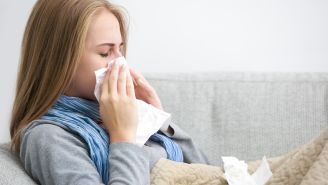Updated on March 5, 2025.
With the flu often comes symptoms like fever, body aches, chills, and congestion. They can last for days, and some may grow so severe that medical help becomes necessary. Yet, less than half of adults in the United States opt to receive the flu vaccine each year, according to the Centers for Disease Control and Prevention (CDC).
There are many reasons a person might skip vaccination. They may believe the shot doesn’t work or have concerns about its safety. They might think healthy people don’t need a flu shot, or that having the flu itself is a better option. They might simply forget.
With that in mind, here are four common rationales for passing over the flu vaccine—and why it’s a wise idea to be immunized.
“I’m healthy. I don’t need the flu shot.”
Anyone can get the flu. In fact, the CDC estimates the flu caused 9.3 million to 41 million illnesses each year between 2010 and 2024. That’s why experts recommend that people ages 6 months and older get a flu shot each year, ideally in September or October. It can lower your risk of becoming ill and reduce the severity of symptoms if you do get sick.
It also helps to safeguard your family, friends, and community. “Getting the vaccine is about protecting yourself, but it's also about protecting the people around you,” says Radhika Vayani, DO, an internist in Fort Worth, Texas. Those most at risk of flu-related complications include babies and young children, older adults, pregnant people, and those with chronic health issues.
“It’s too late to get the flu shot.”
While experts generally advise people to get the shot as soon as it becomes available, the vaccine is helpful throughout flu season, which usually peaks in January or February and can last as last as late as May.
“The flu shot gives you the flu.”
“I hear this myth about ten times a day,” says Dr. Vayani. "It's impossible. The vaccine is made from viruses that aren't active."
Once you have the shot, it takes about two weeks to build up immunity. During that time, you may feel flu-like side effects, such as headaches or a mild fever. And there's always the chance that you may come down with the flu if you were exposed to it right before or after the shot, before your body's had time to develop immunity.
“Why should I get the shot? There are drugs that treat the flu.”
If you become infected and are prescribed antiviral medication, it can ease symptoms and may shorten the illness by one or two days. It’s important to remember, however, that it's not a cure-all and antivirals have been known to cause side effects like nausea and diarrhea, says Vayani. Her advice is to lower your risk of getting the flu altogether by getting the vaccine.
If you do come down with the flu, see your healthcare provider right away, she adds. The sooner you can get tested and diagnosed, the sooner you can start medication and begin to feel better. The medication is especially important for people at high risk of complications from the flu, such as seniors and people with weakened immune systems.







